Nowadays, there is a growing expansion of smart devices like mobile phones, tablets, smartwatches, etc. Companies are developing mobile applications for sharing brand information with their customers. So, it brings the need to search for the greatest mobile app development tools for Android and iOS in 2024.
This article is for you if you are a product owner looking for custom Android or iOS app development. Here, you can find the tools suitable for crafting an application that would reflect your business goals. Thus, the resulting mobile app will efficiently present your products or services to your customers.
Imagine you want to sketch on a drawing sheet. What will you need to draw it? Creativity is a must, but the basic physical apparatus you would require will be a pencil or any sketch pen. Similarly, for developing an app, the instrument you need will be the development tools.
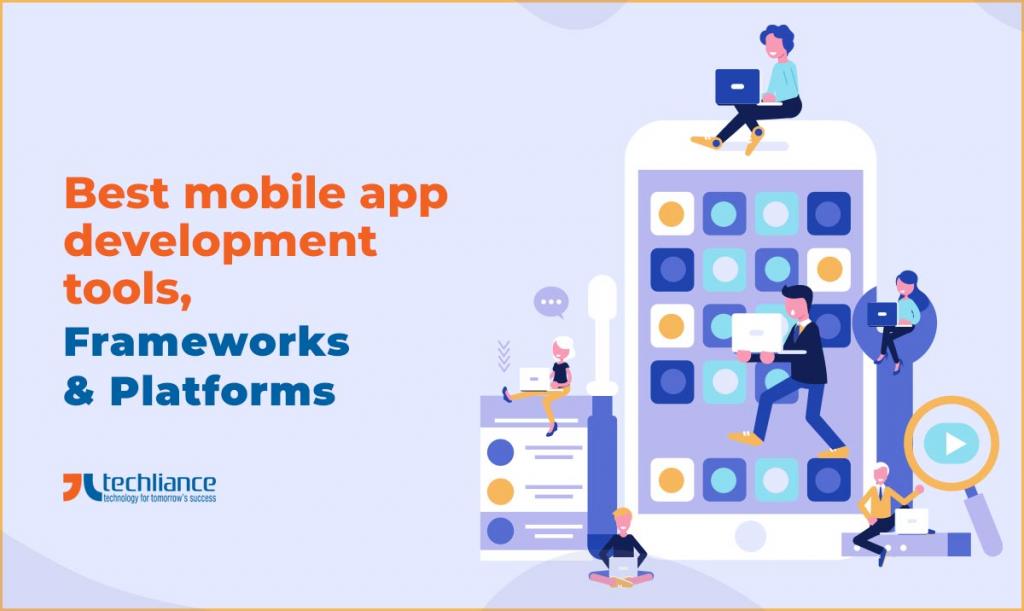
A brief introduction to know mobile app development tools
For the definition, mobile app development tools are software created to assist in the development of mobile applications. These are primarily of two types, native mobile app development tools, and cross-platform mobile app development tools. Native mobile app development tools help in creating specialized applications loaded with top features and high-quality performance for designated platforms.
Cross-platform mobile app development tools facilitate the creation of generic apps that are compatible to run simultaneously on multiple platforms. That too relatively at a low cost and in less time. However, compared to native apps, cross-platform applications have inferior performance.
Key statistics to know about mobile phone adoption
The number of mobile phone users worldwide was 7.1 billion in 2021. A study predicts this number to surge to 7.49 billion by 2025. It means a percentage increase of 5.49% in the forecast period for 2021 to 2025.
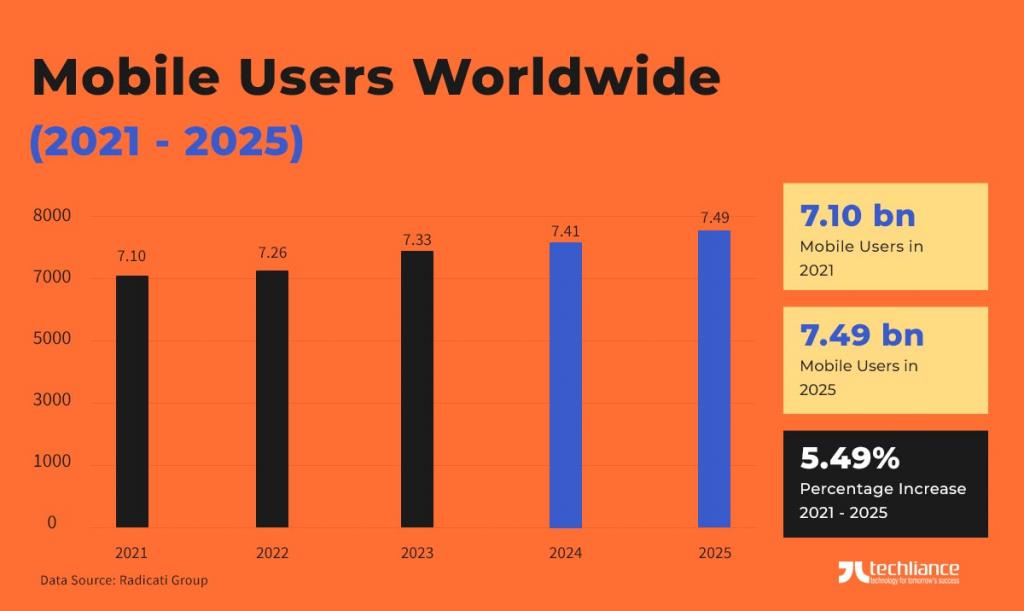
Google Play is the largest digital ecosystem with 3.48 million apps by the 1st quarter of 2022. Apple’s app store is the second biggest, having 2.22 million apps in the same period. Amazon appstore is third with nearly 476000 apps.
In 2022, 6.71 billion smartphone users make a major part of the universal mobile subscriber base. Ericsson forecasts the number to grow to 7.69 billion in 2026. It signifies a percentage increase of 14.61% in the forecast period of 2022 to 2026.
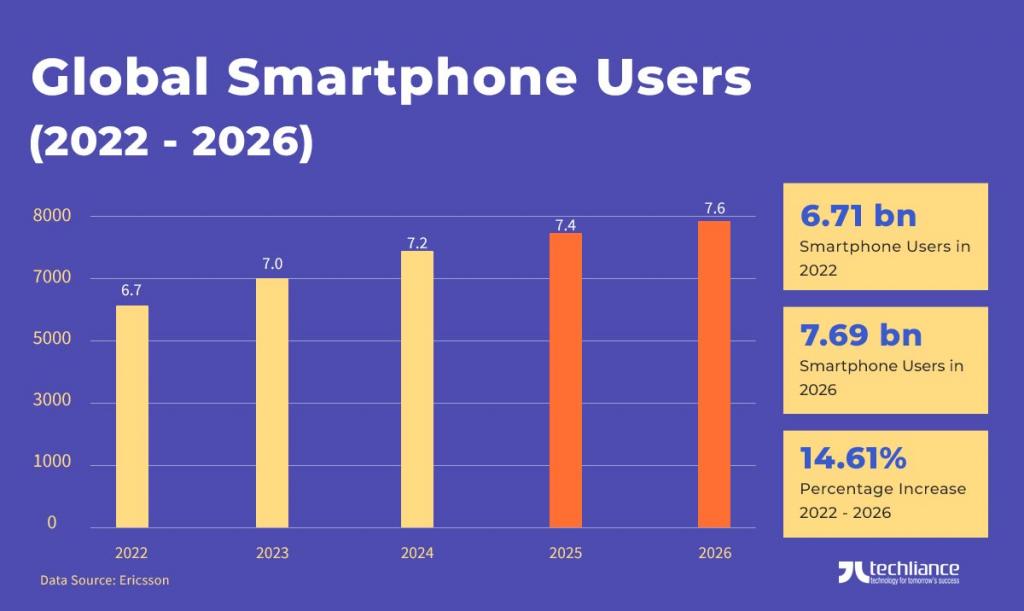
This makes it all the more reason to develop a mobile app that does wonders for the users. Companies are becoming competitive and it has become a norm to launch an app in the market. Because it allows businesses to test the waters for finding ways to higher user interaction and possible expansion.
Globally, mobile applications generated over $318 billion in revenue till 2020. A report estimates the global app revenue to expand to $613 billion by 2025. It denotes a CAGR of 14.03% in the forecast period of 2021 to 2025.
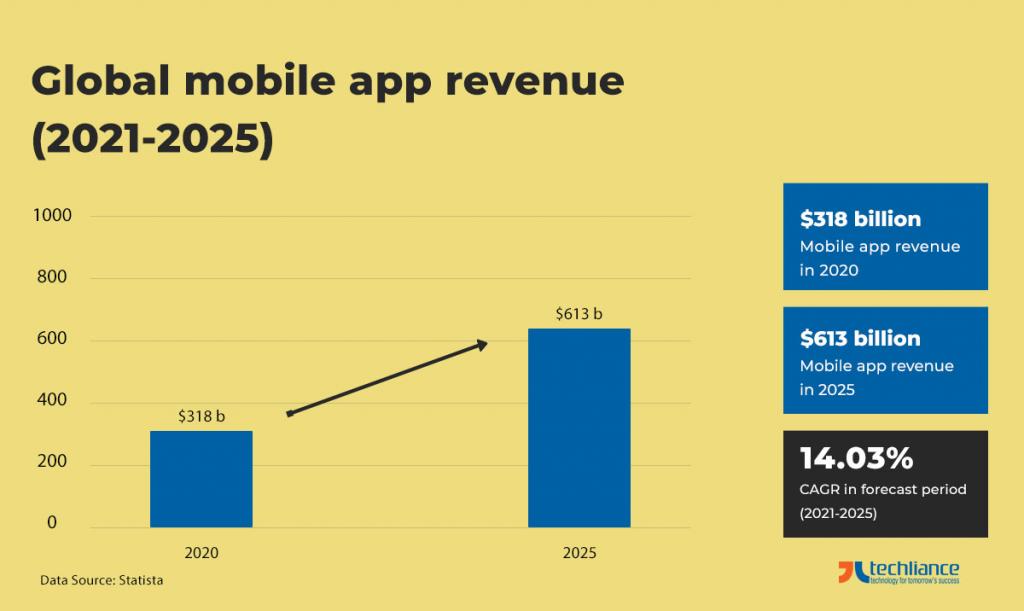
Have you ever thought about the mobile app development tools that are available for creating your application? The primary objective is to select a platform that best aids your business proposition. Moreover, it must present you with a solution that produces greater outcomes.
Chief mobile development frameworks to make quality apps
These are the leading mobile development frameworks that help in the creation of high-performing apps through 2024.
- Flutter
- React Native
- Xamarin
- Apache Cordova
- Ionic
- jQuery Mobile
- NativeScript
- Onsen UI
- Mobile Angular UI
- Sencha Ext JS
Let’s briefly look at these important mobile development frameworks now.
Flutter
One of the popular open-source mobile application frameworks Flutter makes it into the list. Flutter is a UI SDK or toolkit by Google that is widely used for web, mobile, and desktop applications. It is amazing and offers customization with widgets and supports creating native applications in a very short time.
In terms of who is endorsing Flutter — there is one name to lay down the decision to rest: Alibaba. The giant Chinese online retailer decided to create its mobile app in Flutter. Currently, we all know the market reception for its mobile app universally.
What’s in Flutter for you?
Flutter as a mobile app development framework offers these abilities.
- Creation of high-performing native applications
- Supports both iOS and Android platforms
- Built-in material design for greater UI experiences
- Rich motion APIs
- Incorporation of Cupertino (iOS-flavor) widgets
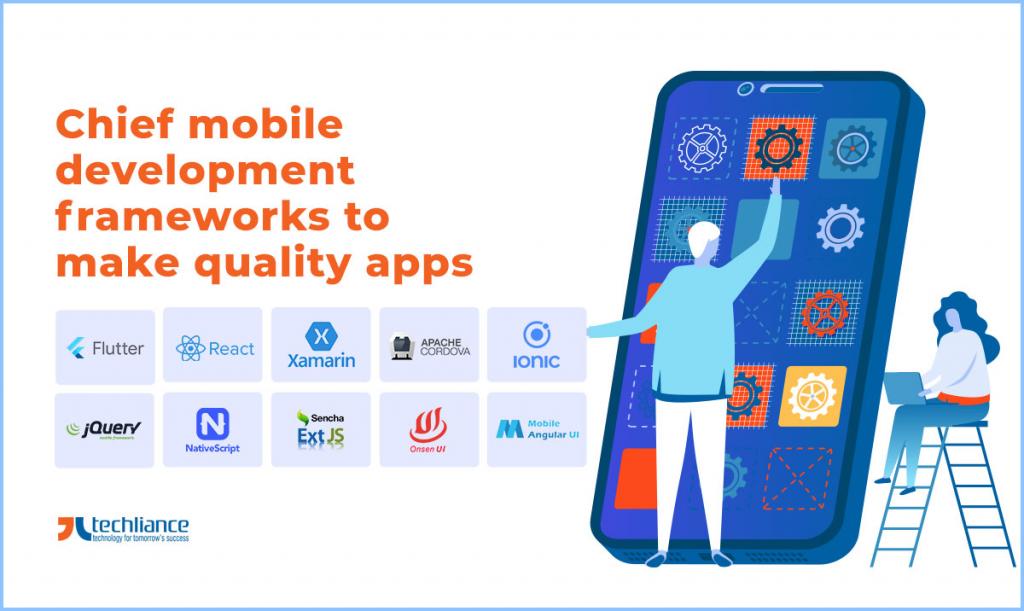
React Native
One of the top contestants in the list, React Native is ideal for developing native mobile applications. Essentially, it is ReactJS (the best JavaScript library) coupled with native platform capabilities. Meta Platforms (formerly Facebook Inc.) and the community develops and maintains this open-source application framework.
Thanks to it, businesses can create rich applications on both iOS and Android platforms. React Native is suitable for building performant applications for Android TV, macOS, tvOS, UWP, Web, and Windows. Reality Labs (formerly Oculus), a business division of Meta Platforms (originally Facebook Inc.) uses it for making virtual reality apps.
You can create a platform-specific version of components to help in using a single codebase across multiple platforms. What started as a community-driven framework by Facebook in 2015, is now powering a lot of web/mobile applications at Facebook. React Native is also the driving force behind Instagram, Coinbase, and Shopify to name a few.
What’s in React Native for you?
React Native has some amazing features such as follows.
- Supports iOS and Android (both native mobile platforms)
- Declarative API for predictive UI
- Low-code so apps run more efficiently
- Integration of compatible third-party plugins
Xamarin
Developed by Microsoft, Xamarin is one of the most common mobile app development tools used for cross-platform application development. It uses the C# programming language to create apps for multiple platforms. For example, iOS, Android, Windows, etc.
Correspondingly, Xamarin provides the code reusability feature. This means around 70% of the code is reusable, letting you write less code and ensuring faster development. Its component stores include cross-platform and third-party libraries, UI controls, etc., to create robust mobile apps.
Likewise, features of application indexing and deep linking are also possible in Xamarin. Although it is a cross-platform app development platform, you can get native performance in your apps with Xamarin. These all benefits are playing role in the rising acceptance of Xamarin worldwide and in the United States.
Xamarin has a diverse development ecosystem with backend, APIs, components, tools, programming languages, and libraries. Some prevalent companies that endorse Xamarin include Fox Sports, Siemens, Pinterest, and even the World Bank. Thus, you can also utilize Xamarin to build building modern & performant iOS and Android apps with C#.
What’s in Xamarin for you?
Xamarin empowers you with these competencies.
- High-performance native applications
- Application loader
- Versatile infrastructure to provide stronger backend constructs for the apps
- Android SDK manager
- Storyboard files
- Diagnostic tools for enabling debugging and error solving
- Google emulator manager
- A strong developer community to learn and grow together
Apache Cordova
An open-source mobile development framework Apache Cordova enables you to develop a single app running on all mobile devices. Formerly known as PhoneGap, it falls into the section of cross-platform app development tools. So, you can integrate Apache Cordova with multiple libraries to improve mobile application development.
With the help of plug-in architecture, it can help you increase the functionality of the mobile apps. Also, Apache Cordova is one of the best tools to build apps with a unique skill set. You need relatively little time and effort during the creation of mobile applications.
Ionic
The open-source mobile app development framework Ionic is widely famous for developing hybrid mobile apps. Also, you can create scalable progressive web apps (PWAs) and desktop applications in it. Ionic (written in JavaScript) was originally built upon AngularJS and Apache Cordova in 2013.
Its integration with Angular is seamless, making Angular a favorite choice for development in Ionic. However, version 4 of Ionic was re-written as a set of web components in 2019. Since the release of Ionic 4, developers can select React, Vue.js, and web components apart from Angular.
Ionic uses web technologies like HTML5, CSS, and SASS. In addition, Ionic offers excellent tools and services to create high-quality and interactive applications. Its cross-platform nature empowers you to craft applications for the web, Android, and iOS.
Besides, businesses can even come up with robust applications that they ship to deployable locations. With a single code base, you can develop suitable applications for all the leading app stores. Since it uses native SDKs and native UI guidelines, you can feel native performance in the apps built upon Ionic.
The integration of Ionic with other tools, libraries, and plug-ins makes the app development procedure quick. A lot of Fintech companies such as eCapital, Finn Partners, and Blytheco use Ionic.
What’s in Ionic for you?
Some of the rewards of Ionic are given below.
- Powerful and stable app development platform
- Complete control over app building that ensures wider capabilities
- Intuitive UI components that enable faster development time
- Community of 5 million developers with great support for even newbies
jQuery Mobile
This touch-optimized web and mobile application framework is a UI system based on HTML5. jQuery Mobile helps you in developing extremely responsive applications for mobile phones, tablets, and even desktops. It has a huge variety of customizable themes that help in creating highly branded websites and interactive mobile apps.
What’s in jQuery Mobile for you?
jQuery Mobile has many benefits.
- Built on jQuery Core but is lightweight
- Automatic initialization
- Developers can start working without any hassle
- Powerful theming framework
- Simple API
NativeScript
Thanks to NativeScript, you can develop interactive native applications using TypeScript, JavaScript, or AngularJS. Also, a single code base allows the deployment of native mobile apps for both Android and iOS. It is one of the best tools to build truly native apps.
By using different sign-on providers, you can ease the authentication feature in the mobile apps built in NativeScript. You can power the application development procedure by accessing hundreds of NativeScript plug-ins. Additionally, it expedites the learning curve for designing native mobile applications.
NativeScript is quite a preferable choice as it helps in code reduction. Also, it decreases the loading time of the app on the users’ phones/systems. NativeScript remains a popular option for businesses as it allows the development of strong web-driven apps.
It allows tapping into specific resources and can access multiple services on a device. For example, a mic, accelerometer, or push notifications. It powers a wide range of navigation programs such as Waze, and even Twitter or Pokemon Go.
What’s in NativeScript for you?
NativeScript offers a range of features including the following.
- Full direct access to Android and iOS APIs
- Native user interface without WebViews
- Build an app that works on both platforms
- Cross-platform application development
- Robust backend support (enables higher and quicker resolution of any backend issues in real-time)
- Mission-critical business support (a crucial factor when it comes to resolving issues that affect app availability for users)
Onsen UI
On the brink of Web 3.0 and metaverse, companies are now focusing attention on delivering mobile apps with greater complexity. Onsen UI makes it in our list for helping in creating complex HTML apps with JS, HTML, and CSS. It has great support for libraries such as Angular JS1, Angular 2+, React, and Vue.
Onsen UI has a great capacity to mold app appearance as per the platform. So, it allows a native look for mobile apps for both iOS and Android. Therefore, the UI components used for both platforms have a great look and feel for their users.
What’s in Onsen UI for you?
Onsen UI provides these advantages.
- Zero time to set up — making it easy for developers to get started without any installations
- Simple to use and easy to learn — a great incentive for newbie developers to pick on the platform
- Time-effective and cost-effective development — Newer businesses can take advantage of developing apps with lesser time and costs
Mobile Angular UI
It allows developers to use AngularJS, HTML5, and Bootstrap for creating powerful mobile app experiences. Mobile Angular UI framework enables you to master components that are missing in Bootstrap 3. Some of these components are overlays, switches, sidebars, scrollable areas, etc.
The fastclick.js and overthrow.js are the prime libraries of Mobile Angular UI that provide a robust mobile experience. Retaining most of the Bootstrap 3 syntax aids in upgrading your present desktop or web apps to mobile. Despite a relatively new mobile development framework, its ease of use puts it among the best.
What’s in Mobile Angular UI for you?
Some of the plus points of Mobile Angular UI features are as follows.
- Build HTML5 based hybrid desktop and mobile apps
- No dependency on jQuery
- Make fully responsive interfaces with a super-small CSS file
Sencha Ext JS
Another mobile application framework Sencha Ext JS is built upon JavaScript. You can use it for building data-intensive applications that run both on the web and mobiles. Sencha previously had another framework Sencha Touch for creating applications for mobiles. In 2015, it was merged into Sencha Ext JS in version 6.
Sencha Ext JS is a cross-platform framework with more than 140 pre-integrated and high-performing UI components. It has hundreds of user extensions. Also, it is a great platform for developing enterprise-level applications.
What’s in Sencha Ext JS for you?
Some of the features of Sencha Ext JS to highlight are the following.
- Flexible layout system for more capacity to build a product as per requirements
- Manages loads of data that enable enterprise systems
- State-of-the-art data-driven documents package (D3)
- Visual data representation to present to higher management
- Powerful analytics with greater room for enabling better decision making
Top mobile development tools to build worthy applications
Given below are the popular mobile app development tools available out there during 2024.
- Xcode
- Android Studio
- Swiftic
- Appcelerator
- TensorFlow
- Firebase
- Mapbox
- neo4j
- Cloud Firestore
- GraphDB
Next, let’s discuss some of these important mobile app development tools globally and in the USA.
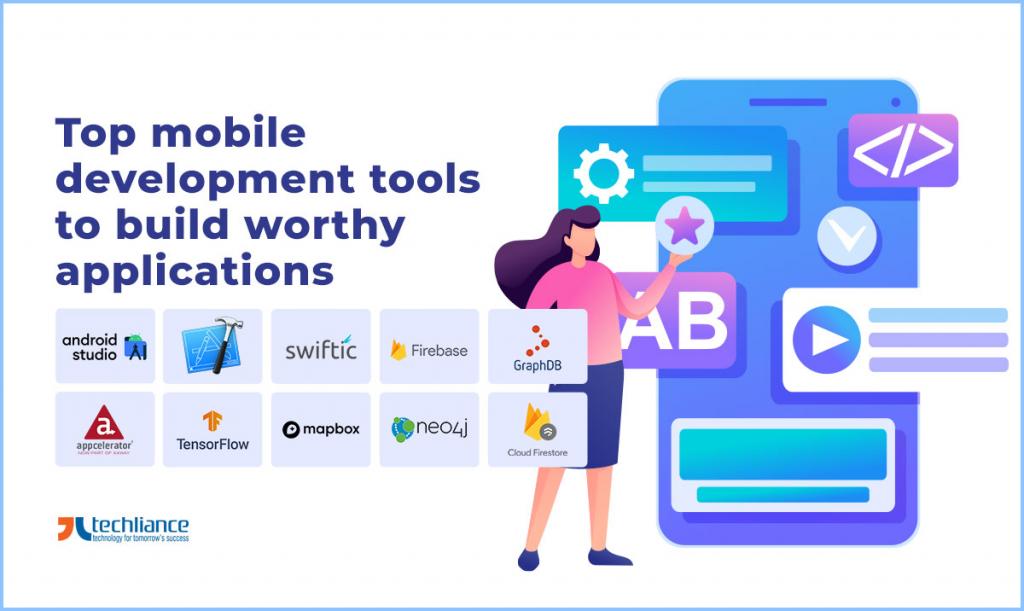
Now, let’s discuss these leading mobile app development tools globally and in the USA.
Android Studio
In case, you are looking for a top-notch tool for building Android apps. Almost all the companies providing Android app development services would recommend Android Studio. It is an official integrated development environment (IDE) to develop native Android applications; that enables easy coding, debugging, and testing.
Android Studio comes with a quick and intelligent code editor. With in-built templates, the app development process becomes much more manageable. The emulator feature provides you with a real-time experience of the developed apps that makes testing easy. Also, it has a visual layout editor to create applications’ layouts by adding various attributes.
Swiftic
As a DIY tool for making iOS and Android applications, Swiftic provides an easy-to-navigate interface. Especially, for custom iOS app development of business-centric applications, Swiftic can work as a reliable and efficient development platform. Therefore, with Swiftic, it becomes easy to design a bespoke iOS app or loyalty program for businesses.
Publishing your app on noteworthy app stores is relatively easy through Swiftic. Catching the users’ attention becomes simple by sending eye-catching push notifications. Consequently, you can quickly reach customers and increase customer loyalty with the apps built on Swiftic without difficulty.
Swiftic’s popularity remains high as the go-to platform for building iOS/Android apps, for even people having no development experience. Because the platform has an extremely easy-to-use interface. This makes even beginner developers get familiar with it in no time.
Swiftic is a convenient option as it offers a 30-day money-back guarantee for all plans. Since 2015, Swiftic has even provided a 6-month success guarantee scheme. If you are not able to get any results from Swiftic, then you get a 6-month free service.
This comes to show how confident the app maker is about its success metrics. Swiftic empowers businesses to develop user-centric products. The result is mobile applications with a greater margin for delivering requirements as desirable.
What’s in Swiftic for you?
Swiftic allows the creation of different kinds of mobile applications. It is a more convenient choice for building eCommerce apps. Equally, Swiftic has a variety of features that online businesses can use to showcase and sell their products.
- Build mobile stores to enable users to browse through product catalogs
- App publication assistance
- Greater app security
- Allowing users to order with checkout
- Push notifications that are useful for customer alerts
- Loyalty card scheme that helps in the conversion of users into consumers
- In-app coupons for building loyalty programs
- Scratch cards for buyers to win prizes
- SEO enablement with social media feeds
- Advanced analytics
- Third-party integration for a wider customer engagement and management
Appcelerator
Among the premier cross-platform mobile app development tools comes Appcelerator. It uses fewer lines of code for developing mobile applications, that are compatible with multiple platforms. For instance, Windows, iOS, Android, or browser-based HTML5 web apps.
Appcelerator enhances the speed of the application development process. Besides, cloud capacity limits are high in this tool. It supports deployment in multi-region globally. Therefore, Appcelerator is an impressive tool to build mobile apps for almost all operating systems.
TensorFlow
Are you planning to make an AI-based app? Well, if yes, then TensorFlow could emerge as your favorite choice. Because it is an end-to-end open-source software library used for creating applications based on machine learning and artificial intelligence.
Created by Google, it is a platform for dataflow programming and deep learning systems. As an open-source software platform, TensorFlow allows rapid numerical computation using data flow graphs. The feature columns construct a bridge between raw data and the estimators that help make the experimentation easy.
You can quickly train it on CPU and GPU for distributive computing. Since Google developed it, you get a massive community that constantly works for improvisations. Furthermore, it assists you with your issues while programming an app.

Final Thoughts
This article provides you with some of the world-class mobile app development tools. Also, we have carefully outlined some of the popular and widely used mobile development frameworks and platforms. Areas of specialty and industry usage are great factors in deciding whether a platform is good for you or not.
The majority of successful businesses endorse these platforms for building mobile applications. This encourages newer businesses to develop mobile apps and explore their market potential. Businesses with no prior experience can contract technology partners for creating stellar apps with great commercial success.
As per your business requirements, you can hire an Android or iOS app development company to develop a robust application. Nevertheless, it is better to go through the merits and demerits of the tools yourself before making the final choice. Going mobile is necessary for you in this digital era to stay relevant and futureproof your business.
Do you want a performant native mobile app? Are you looking to launch MVP in the form of a cross-platform application? Connect with Techliance to take you from ideation to development to deployment.




